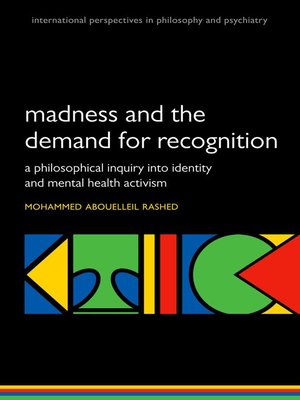Madness and the demand for recognition
ebook ∣ A philosophical inquiry into identity and mental health activism · International Perspectives in Philosophy & Psychiatry
By Mohammed Abouelleil Rashed

Sign up to save your library
With an OverDrive account, you can save your favorite libraries for at-a-glance information about availability. Find out more about OverDrive accounts.
Find this title in Libby, the library reading app by OverDrive.



Search for a digital library with this title
Title found at these libraries:
| Library Name | Distance |
|---|---|
| Loading... |
Madness is a complex and contested term. Through time and across cultures it has acquired many formulations: for some, madness is synonymous with unreason and violence, for others with creativity and subversion, elsewhere it is associated with spirits and spirituality. Among the different formulations, there is one in particular that has taken hold so deeply and systematically that it has become the default view in many communities around the world: the idea that madness is a disorder of the mind. Contemporary developments in mental health activism pose a radical challenge to psychiatric and societal understandings of madness. Mad Pride and mad-positive activism reject the language of mental 'illness' and 'disorder', reclaim the term 'mad', and reverse its negative connotations. Activists seek cultural change in the way madness is viewed, and demand recognition of madness as grounds for identity. But can madness constitute such grounds? Is it possible to reconcile delusions, passivity phenomena, and the discontinuity of self often seen in mental health conditions with the requirements for identity formation presupposed by the theory of recognition? How should society respond? Guided by these questions, this book is the first comprehensive philosophical examination of the claims and demands of Mad activism. Locating itself in the philosophy of psychiatry, Mad studies, and activist literatures, the book develops a rich theoretical framework for understanding, justifying, and responding to Mad activism's demand for recognition.







